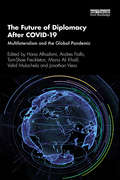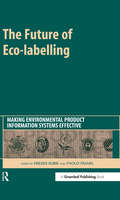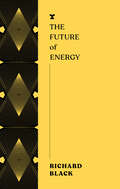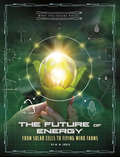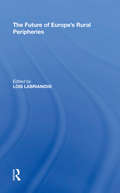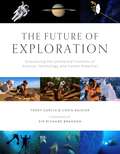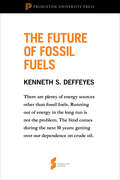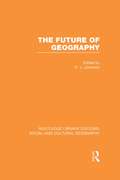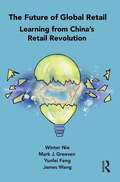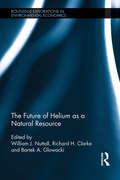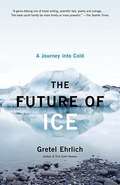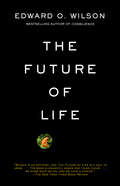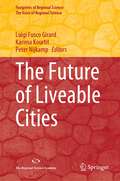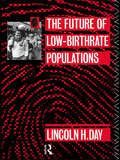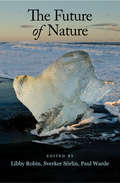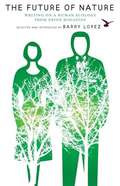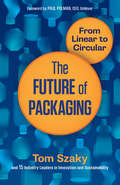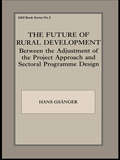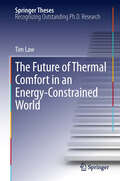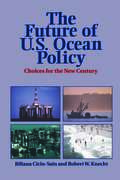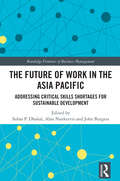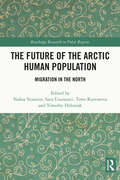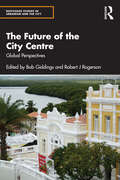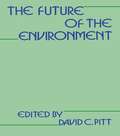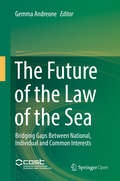- Table View
- List View
The Future of Diplomacy After COVID-19: Multilateralism and the Global Pandemic
by Hana AlhashimiThis book considers the impact of the COVID-19 pandemic on international diplomacy, and the challenges and opportunities it presents for the future of multilateralism. Global cooperation and solidarity are central to responding to and mitigating the health and socio-economic effects of the COVID-19 pandemic, yet, to many, this was slow to mobilize and lacking in political leadership. This book takes a practical look at the lessons learned from the period spanning the World Health Organization’s first declaration of a public health emergency of international concern in January 2020, to the commemoration of the 75th Anniversary of the United Nations in October 2020. This timespan covers a critical period in which to consider key areas of diplomacy, covering a range of tools of global cooperation: multilateral diplomacy, the rule of law, sustainable development, economics and financing, digital governance, and peace and security. Each chapter in this book introduces readers to the current situation in their respective areas, followed by a constructive consideration of lessons learned from the pandemic’s impact on that field, and key recommendations for the future. The practical focus and future orientation is particularly important as the book injects pragmatism and guidance that will facilitate ‘building back better’ in COVID response plans, while creating space for continued focus on global commitments around sustainable development and the future of the UN. Written by a team of authors who have worked directly in International Public Policy and the establishment of global agendas at the United Nations, this book will be essential reading for professionals and policymakers involved in diplomatic roles, as well as students and scholars interested in the future of international relations, global governance and sustainable development.
The Future of Eco-labelling: Making Environmental Product Information Systems Effective
by Frieder Rubik Paolo FranklEco-labelling is one of the key tools used by policy-makers in many parts of the world to encourage more sustainable production and consumption. By providing environmental information on products and services, eco-labels address both business users and consumers and range from mandatory approaches, such as required product declarations, to voluntary approaches, such as national eco-labels. Eco-labels can play an important role in environmental policy. They reward and promote environmentally superior goods and services and offer information on quality and performance with respect to issues such as health and energy consumption. Eco-labels fit well into a multi-stakeholder policy framework – as promulgated recently by the EU's integrated product policy (IPP) – since the development of criteria for labels and the acceptance in the market requires the involvement of a wide range of different parties, from government and business, to consumers and environmental organisations. However, many eco-labelling schemes have had troubled histories, and questions have been raised about their effectiveness. So, are eco-labels an effective tool to foster the development, production, sale and use of products and to provide consumers with good information about the environmental impacts of those products? Is eco-labelling useful to business as a marketing tool? What factors contribute to the development of successful schemes? More than ten years after its establishment, can the EU Flower be considered a success? Are national eco-labels such as the German Blue Angel and the Norwegian White Swan more effective? Should eco-labels be harmonised? Are eco-labels achieving their original aim of fostering sustainable production and consumption? For which product groups are ISO type I eco-labels appropriate and inappropriate? Are other labels, such as mandatory, ISO type II and ISO type III labels more effective in some cases? Are eco-labels focusing on the main environmental policy targets or just on "low-hanging fruit"? Are eco-labels really linked to other tools of IPP? The Future of Eco-labelling provides answers to all of these questions. Based on a major EU research exercise, the book plots a course for policy-makers to address some of the historic problems with eco-labelling, to learn what works and what doesn't and to move forward with schemes that can make a real difference to sustainable production and consumption.The book analyses the conditions under which eco-labelling schemes-both mandatory and voluntary-are or can become an efficient and effective tool to achieve given objectives; assesses previous experiences with eco-labels in different European countries and the relationship of these schemes with business strategies, IPP and market conditions; defines strategies aimed at linking eco-labels with other IPP measures; explores how eco-labels can be used to encourage sustainable consumption patterns, create green markets, foster innovation and development of green products and services, and implement multi-stakeholder initiatives; and sets out detailed recommendations for the future of eco-labelling.The book will be required reading for policy-makers, businesses involved with eco-labelling schemes and researchers interested in the development of sustainable production and consumption and IPP worldwide.
The Future of Energy (The FUTURES Series)
by Richard BlackHow will the world produce more, cleaner energy? Climate communications expert Richard Black sets out a vision for the future which could benefit us all.Coal, oil and gas provide four-fifths of the energy that powers our modern world. But continuing to burn them will mean wrecking the only planet we have. Is there a way out?In The Future of Energy, journalist and analyst Richard Black argues that there is, and that the transition to a clean energy world is already underway. He shows that with just five key technologies we can replace the burning of fossil fuels almost entirely, as quickly as society decides.Doing so will do much more than halt climate change. The transition will bring cheaper energy, cleaner air, and more jobs. It will remove some of the factors behind oppression, injustice, and conflict. And it is supported by an overwhelming majority of the world&’s population. This may not be the story of energy that you hear most about from politicians, business leaders and journalists, but it is the one that matters.
The Future of Energy: From Solar Cells to Flying Wind Farms (What the Future Holds)
by M. M. EbochOur world runs on energy! But traditional fossil fuels are doing great damage to the environment, and they will eventually run out. How might solar, water, wind and geothermal power come to our rescue? Readers can discover how different the world could look in the future with energy sources that are clean and renewable.
The Future of Europe's Rural Peripheries: Entrepreneurship, Employment Problems And Social Marginalisation (Ashgate Economic Geography Ser.)
by Lois LabrianidisBringing together case studies from Germany, Greece, Poland, Portugal and the UK, this book examines the contribution of entrepreneurial ventures and new technology in stimulating economic development in rural locations. It looks at instances of 'good practice' in terms of both public and private initiatives, and develops a coherent combination of policy objectives facilitating the long-term economic development of the countryside. Firstly analyzing the key causes and effects of economic restructuring currently affecting Europe's rural areas, the book then explores the consequences that European integration and 'globalization' have had and will have in future. It identifies sources of entrepreneurship and examines their distribution between different gender, age and other social groupings. The book continues to evaluate the extent to which the existing institutional, social and technological environment and infrastructure encourages and facilitates entrepreneurship.
The Future of Exploration: Discovering the Uncharted Frontiers of Science, Technology, and Human Potential
by Chris Rainier Terry GarciaAt this very moment, explorers in some of the most remote and dangerous places on earth, from the deepest parts of the ocean, to the highest mountains, and to outer space are enduring unimaginable hardships to expand our knowledge and save what is truly important.Join former National Geographic Executive Vice President and Chief Science Officer Terry Garcia and nature and cultural photographer Chris Rainier, a National Geographic Explorer, on a journey with some of the world&’s most renowned and respected explorers, scientists, astronauts, visionaries, thinkers, and authors as they discuss and share their insights about what motivates them, what is left to explore, and why we should care in The Future of Exploration. Exploration is as old as humankind, but there are still surprises that await us. With technology opening doors that once seemed permanently closed, the twenty-first century will be the greatest age of exploration in our history. Accompanied with awe-inspiring photography, each contributor shares their personal achievements and insight into what the future of exploration looks like from their respective fields, the challenges we face, and possible solutions. Whether delving into the terrestrial, oceanic, or cosmic frontiers, embark on a journey into the uncharted future and be inspired yourself to be a part of the future of exploration.
The Future of Fossil Fuels: From Hubbert's Peak (Princeton Shorts #4)
by Kenneth S. DeffeyesAs debates about the effects of fossil fuels on our climate and foreign policy intensify, the question of just how much longer we can depend on this finite source of energy becomes more and more pressing. This selection from Hubbert's Peak, the leading book on the limits of our oil supply, forecasts what the future will bring for fossil fuels and what the alternatives are likely to be. Princeton Shorts are brief selections excerpted from influential Princeton University Press publications produced exclusively in eBook format. They are selected with the firm belief that while the original work remains an important and enduring product, sometimes we can all benefit from a quick take on a topic worthy of a longer book. In a world where every second counts, how better to stay up-to speed on current events and digest the kernels of wisdom found in the great works of the past? Princeton Shorts enables you to be an instant expert in a world where information is everywhere but quality is at a premium. The Future of Fossil Fuels does just that.
The Future of Geography (Routledge Library Editions: Social and Cultural Geography)
by R. J. JohnstonThe chapters in this book address fundamental questions of the nature and purpose of geography, scrutinising its contents, philosophy and methodology. Aimed at undergraduates its purpose is to broaden the debate about what geography had become during the 1980s and what shape it might take in the future.
The Future of Global Retail: Learning from China's Retail Revolution
by James Wang Winter Nie Mark J. Greeven Yunfei FengChina’s new retail revolution will completely transform how the world thinks about retail and digital innovation. But is the world ready yet? In this book, the authors share an insider’s perspective on what is happening in China to reveal the future for global retail, and a clear framework to help you prepare. The book presents a number of real-world cases, based on interviews and first-hand consumer experience, to decode China’s retail revolution so that you can understand what is happening and why, and what it means for the rest of the world. Crucially, the book identifies five critical stages in the development of new retail that global retail executives need to grasp now: lifestyle commerce, Online-Merge-Offline retail, social retail, livestream retail and invisible retail. To help the industry get ready for this new, China-inspired paradigm in retail, the authors present a practical and simple framework – a ten-year strategic roadmap for global retail executives, which we call the “Beyond” the Value Chain Model. China’s new retail is not just about fashion, cosmetics, snacks, data-driven convenient stores and commercial live streaming. At a time when the world of retail is being upended, it offers inspirational lessons in innovation, purpose and agility for global executives across the entire retail spectrum.
The Future of Helium as a Natural Resource (Routledge Explorations In Environmental Economics Ser.)
by William J. Nuttall Richard H. Clarke Bartek A. GlowackiThe book reveals the changing dynamics of the helium industry on both the supply-side and the demand-side. The helium industry has a long-term future and this important gas will have a role to play for many decades to come. Major new users of helium are expected to enter the market, especially in nuclear energy (both fission and fusion). Prices and volumes supplied and expected to rise and this will prompt greater efforts towards the development of new helium sources and helium conservation and recycling.
The Future of Ice: A Journey into Cold
by Gretel EhrlichTo understand the complex, primal nature of cold, Ehrlich traveled to extreme points, from Tierra del Fuego to the Arctic circle. In this volume she reports on her experiences of the many expressions of cold--wind, water, snow and ice--and describes the history of these elements and of ocean currents and weather cycles. She attempts to uncover through her experiences the quintessential connection between humans and the physical world. Annotation ©2004 Book News, Inc. , Portland, OR (booknews. com)
The Future of Life
by Edward O. WilsonOne of the world’s most important scientists, Edward O. Wilson is also an abundantly talented writer who has twice won the Pulitzer Prize. In this, his most personal and timely book to date, he assesses the precarious state of our environment, examining the mass extinctions occurring in our time and the natural treasures we are about to lose forever. Yet, rather than eschewing doomsday prophesies, he spells out a specific plan to save our world while there is still time. His vision is a hopeful one, as economically sound as it is environmentally necessary. Eloquent, practical and wise, this book should be read and studied by anyone concerned with the fate of the natural world.
The Future of Liveable Cities (Footprints of Regional Science)
by Peter Nijkamp Karima Kourtit Luigi Fusco GirardThis book explores the concept of livable cities, where people enjoy living and being, and examines indicators of citizens' well-being in relation to the urban environment. It is authored by experts from diverse disciplines, providing a citizen-centered perspective on urban well-being in sustainable, environmentally friendly, and climate-neutral (or -positive) cities. The contributions focus on the human and social aspects of cities, developing operational models and frameworks for circular cities, smart resource utilization, and examining contextual factors such as environmental and neighborhood quality, energy transition, climate neutrality, and recycling as factors that influence the well-being of "homo urbanus.” The chapters approach these topics from various analytical perspectives, including conceptual/theoretical, methodological/modeling, policy/planning, and evidence-based case studies. This book will be of interest to scholars in regional and spatial science, urban geography, economics, and related fields, as well as those interested in urban well-being.
The Future of Low Birth-Rate Populations
by Lincoln H. DayFirst Published in 2004. Routledge is an imprint of Taylor & Francis, an informa company.
The Future of Nature
by Paul Warde Sverker Sorlin Libby RobinThis anthology provides a comprehensive overview of the science behind environmental prediction and how, as predictions about environmental change have been taken more seriously and widely, they have affected politics, policy, and public perception. Through an array of texts and commentaries that examine the themes of progress, population, environment, biodiversity, and sustainability from a fully global perspective, it shows how twenty-first century predictors think about what forecasting the future means. Providing access and reference points to the origins and development of key disciplines and methods, it will encourage policy makers, professionals, and students to reflect on the roots of their own theories and practices.
The Future of Nature: Writing on a Human Ecology from Orion Magazine
by Barry LopezThe western mindset is arguably one of the greatest threats to the world's ecological balance. Corporatism and globalization are two of the obvious villains here, but what part does human nature play in the problem? Since its inception in 1982, "Orion" Magazine has been a forum for looking beyond the effects of ecological crises to their root causes in human culture. Less an anthology than a vision statement, this timely collection challenges the division of human society from the natural world that has often characterized traditional environmentalism. Edited and introduced by Barry Lopez, "The Future of Nature" encompasses such topics as local economies, the social dynamics of activism, America's incarceration society, naturalism in higher education, developing nations, spiritual ecology, the military-industrial landscape, and the persistent tyranny of wilderness designation. Featuring the fine writing and insights for which "Orion" is famous, this book is required reading for anyone interested in a livable future for the planet.
The Future of Packaging: From Linear to Circular
by Tom SzakyOutstanding Book of the Year gold medalist and "Most Likely to Save the Planet" from the Independent Book Publisher Awards.Tom Szaky sets out to do the impossible – eliminate all waste. This book paints a future of a "circular economy" that relies on responsible reuse and recycling to propel the world towards eradicating overconsumption and waste. Only 35 percent of the 240 million metric tons of waste generated in the United States alone gets recycled, according to the Environmental Protection Agency. This extraordinary collection shows how manufacturers can move from a one-way take-make-waste economy that is burying the world in waste to a circular, make-use-recycle economy. Steered by Tom Szaky, recycling pioneer, eco-capitalist, and founder and CEO of TerraCycle, each chapter is coauthored by an expert in his or her field. From the distinct perspectives of government leaders, consumer packaged goods companies, waste management firms, and more, the book explores current issues of production and consumption, practical steps for improving packaging and reducing waste today, and big ideas and concepts that can be carried forward.Intended to help every business from a small start-up to a large established consumer product company, this book serves as a source of knowledge and inspiration. The message from these pioneers is not to scale back but to innovate upward. They offer nothing less than a guide to designing ourselves out of waste and into abundance.
The Future of Rural Development: Between the Adjustment of the Project Approach and Sectoral Programme Desig
by Hans GsangerThis book gives a practitioner's account of international experiences with rural development seen from a German angle. It argues for a development co-operation for rural areas that actively supports popular participation, beneficiaries' self-organization, decentralization and, consequently, smaller self-managed (para)projects rather than large, top-down organized rural development projects.
The Future of Thermal Comfort in an Energy- Constrained World
by Tim LawThe dissertation investigates the scientific and business factors that have resulted in air-conditioning being a major contributor to climate-change. With his architectural background, the author demonstrates how a design methodology, not commonly adopted in scientific studies, may actually be a suitable way of dealing with a complex problem: the 'business as usual' scenario involving building science, sociological values and consumer behavior. Using his innovations as case studies, the author shows how good ideas cannot be evaluated on scientific merit alone and demonstrates why commercialization may have a pivotal role in deployment of research-based technology. He advances the theory of personalized thermal comfort which can potentially resolve the air-conditioning conundrum.
The Future of U.S. Ocean Policy: Choices For The New Century
by Robert Knecht Biliana Cicin-SainThe United States is about to embark on the most thorough reconsideration of its ocean policy in more than three decades. With 1998 designated as the International Year of the Ocean by the United Nations, and with both the executive branch and the Congress currently working toward developing new approaches to formulating and implementing ocean policy, a comprehensive overview of key issues and concerns is essential.The Future of U.S. Ocean Policy provides such an overview, with an in-depth analysis of the evolution of U.S. ocean policy and a timely discussion of the most important ocean and coastal issues facing the nation. The book assesses the current status of ocean policy, examines national and international trends, and considers choices for policymakers in the 21st century. Following an introductory chapter that reviews national ocean policy and the process by which it is made, the authors: review the history of development of U.S. ocean and coastal policy examine the major ocean laws enacted in the 1970s and review and assess their record of implementation examine factors that will affect U.S. ocean policy in the coming decade discuss the need to make policy more coherent, and to develop institutional mechanisms that can foster more effective guidance and oversight present a set of policy options for improving U.S. ocean policyThe Future of U.S. Ocean Policy is the only recent book that focuses on national ocean policy in its entirety, and will play an important role in upcoming debates concerning the future direction of policy initiatives. Agency personnel, members and staff of nongovernmental organizations, industry groups, Congressional staffers, state and local government officials, academics, and concerned citizens will find the book an invaluable guide, as will students and faculty in courses in marine and coastal management and in environmental management.
The Future of Work in the Asia Pacific: Addressing Critical Skills Shortages for Sustainable Development (Routledge Frontiers of Business Management)
by John Burgess Alan Nankervis Subas P. DhakalBringing together informed analyses on the challenges of critical skill shortages (CSS) in the Asia-Pacific region, this book provides 14 country reports to discuss the critical jobs and skills to achieve long-term policies and approaches towards realising the United Nations sustainable development goals (SDGs).The contributors of the volume discuss the workforce projections and planning, existing programmes that address the skills and jobs needed, and workforce policy challenges that need to be addressed to achieve the SDGs. The book identifies two types of CSS present in the workforce: one being skilled labour shortages in existing industries and the second being soft skills like critical thinking and problem-solving skills. Extending the discussion beyond immediate skill shortages, the book assesses longer-term policies and approaches to tackle the 2030 United Nations Agenda for Sustainable Development.This book will interest researchers in the fields of human resource management and development, international business, development studies, and policymakers from the Asia-Pacific region.
The Future of the Arctic Human Population: Migration in the North (Routledge Research in Polar Regions)
by Timo Koivurova Satu Uusiautti Nafisa Yeasmin Timothy HeleniakThe Future of the Arctic Human Population seeks to explore the challenges of Arctic migration, immigrants, and refugees and how integrated societies can be developed. Moreover, it discusses disparities between regions on policies and their implementation. This book explores how cross-border cooperation is needed to provide innovative solutions to migration challenges such as cultural differences, acceptance, and integration into local communities, and joining the labour market. It examines whether there are regional differences in well-being among immigrants in Arctic countries. The book considers how we can build and model integrated societies, and what tools and measure can be used to assess inclusive and resilient societies.
The Future of the City Centre: Global Perspectives (Routledge Studies in Urbanism and the City)
by Bob Giddings Robert J RogersonThe Future of the City Centre: Global Perspectives debates future directions. It looks beyond the post-industrial, post-commercial, and post-retail city centres to examine differing visions of the future form and function of the urban core. This theme and the related sub-topics will assist the development of future city models and help to contextualise urban change. The in-depth research covers not only urban form and the re-use of the built heritage but also the provision for cultural events and different forms of entertainment that will offer vitality, together with visitors and responsible tourism. City authorities are starting to realise that structural changes are happening in city centres, as their influence is declining, and therefore new forms of governance will be needed. The book is based on an international research network hosting four symposia over 24 months. They took place in four cities in four different continents to encompass a world view of developed and developing countries. This book offers theoretical and practical perspectives from leading thinkers, academics, and practitioners, drawing on thematic issues explored across four international cities: Newcastle, UK; Newcastle, Australia; Pretoria-Tshwane, South Africa; and João Pessoa, Brazil. It draws on a wider set of global examples to reveal the shared issues and pressures being brought to bear on city centres and the diversity of responses being undertaken to ensure their long-term future. The book includes illustrations from cities around the world, and it is directed at academics, students, and professionals in architecture, planning, urban design, the built environment, geography, economics, sociology, and cultural studies.
The Future of the Environment: The Social Dimensions Of Conservation And Ecological Alternatives (European Year Of The Environment Ser.)
by David PittA major concern of this book is how ordinary people might come to manage their own environment more effectively. A valuable resource for students of environmental studies, it considers how this might be facilitated by more appropriate technology, assistance and communications. Reviewed by the International Journal of Environmental Studies, it has`... something of interest and information in every chapter of this book and I urge all readers to look at it carefully, for its combination of the examination of general principles and down-to-earth data and problems is one of the best for years'.
The Future of the Law of the Sea
by Gemma AndreoneThis book is open access under a CC BY-NC 4. 9 license. It explores the diverse phenomena which are challenging the international law of the sea today, using the unique perspective of a simultaneous analysis of the national, individual and common interests at stake. This perspective, which all the contributors bear in mind when treating their own topic, also constitutes a useful element in the effort to bring today's legal complexity and fragmentation to a homogenous vision of the sustainable use of the marine environment and of its resources, and also of the international and national response to maritime crimes. The volume analyzes the relevant legal frameworks and recent developments, focusing on the competing interests which have influenced State jurisdiction and other regulatory processes. An analysis of the competing interests and their developments allows us to identify actors and relevant legal and institutional contexts, retracing how and when these elements have changed over time.
